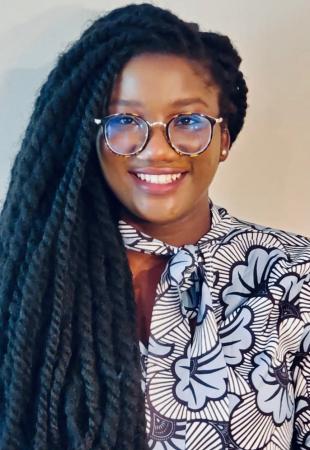Alima Ballo, who is immersed in her first semester as a student in the Wallace H. Coulter of Biomedical Engineering at Georgia Tech and Emory University after transferring from Montgomery (Maryland) College, spent her summer engaged in a new virtual reality.
The Covid-19 pandemic has disrupted many things, and that includes traditional summer internships. To help replace those lost opportunities, the BME Alliance of Cleveland Clinic and Case Western Reserve University offered a “virtual” summer internship experience (June 9 to August 13). Ballo was part of a global cohort – more than 500 students from more than 50 universities around the world.
“It was a great experience to meet and talk with people from different countries and backgrounds, and all this just five minutes from the Georgia Tech campus,” says Ballo, who moved to Atlanta over the summer, just before the internship, and is used to meeting people from different countries where they live.
Born in New York, she grew up in Ivory Coast, West Africa, lived in France for several years, then moved to Maryland several years ago because she wanted to study in the United States. She studied bioengineering at Montgomery College for two years and after being accepted at Georgia Tech, registered for the BME Alliance internship, which was a widespread effort to increase PPE compliance in universities this fall.
Over the 10-week course of the virtual internship, undergraduate students participated in seminars focused on careers in biomedical engineering, applying to grad school, how to present and write scientific papers. They sat in on ‘fireside chats’ with leading BME faculty from both Case Western and Cleveland Clinic.
Students also were able to work in teams, remotely, on a research/design project focusing on the response to the Covid-19 pandemic – a project that culminated in an online pitch competition at the end of the internship, featured on YouTube. Ballo partnered with students from George Mason University (Faraan Chowdry, a sophomore) and Worcester Polytechnic Institute (Marissa Gonzales, a senior) on a device they called ‘COVID Veil.’
Before starting their project, the students polled 35 college students on LinkedIn, asking them what is the most difficult part about wearing a protective mask. Nearly 70 percent of the respondents said that breathing difficulty was the main issue, and 60 percent prioritize comfort when looking for a mask.
“Based on our survey, our team decided to focus on the client’s comfort while giving total protection to him and the people around him,” says narrator Alima Ballo’s voice on the Covid Veil team’s video (watch it here). So the team designed a device comprised of a double layered cotton veil attached to a pair of glasses, protecting the eyes, nose, and mouth – PPE that could be worn for a long period time without becoming uncomfortable.
And Ballo has managed to leverage her summer virtual internship into another internship.
“One of my goals for this semester was to look for more opportunities and get another internship focused on medical devices,” says Ballo, who found exactly what she wanted: a position with MedTech Flow, a company focused on cardiac implants.
Media Contact
Writer
Georgia Tech (EVPR/BME)
Keywords
Latest BME News
Jo honored for his impact on science and mentorship
The department rises to the top in biomedical engineering programs for undergraduate education.
Commercialization program in Coulter BME announces project teams who will receive support to get their research to market.
Courses in the Wallace H. Coulter Department of Biomedical Engineering are being reformatted to incorporate AI and machine learning so students are prepared for a data-driven biotech sector.
Influenced by her mother's journey in engineering, Sriya Surapaneni hopes to inspire other young women in the field.
Coulter BME Professor Earns Tenure, Eyes Future of Innovation in Health and Medicine
The grant will fund the development of cutting-edge technology that could detect colorectal cancer through a simple breath test
The surgical support device landed Coulter BME its 4th consecutive win for the College of Engineering competition.








